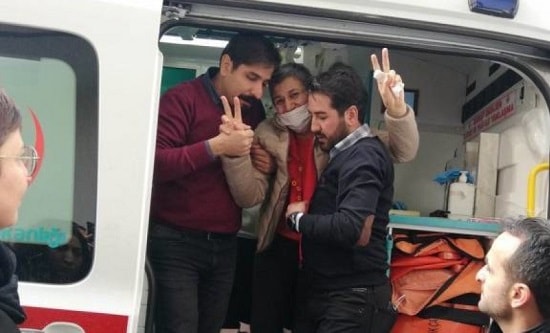
Leyla Guven, Peoples’ Democratic Party (HDP) MP and co-chair of the Democratic Society Congress, began an indefinite hunger strike in a Diyarbakir prison on 8 November 2018. She is demanding an end to the isolation of the Kurdish leader Abdullah Ocalan, imprisoned on Imrali Island in the Sea of Marmara, close to Istanbul. Leyla was released from prison on 25 January after 79 days of hunger strike, with an international travel ban, but said that her protest will continue in her home until Ocalan is able to meet regularly with his family and lawyers. Leyla has been joined on hunger strike by 44 other women prisoners across Turkey, and there are now around 250 prisoners on indefinite hunger strike. Kurdistan Workers’ Party (PKK) and Kurdistan Free Life Party (PJAK) prisoners issued a statement on 26 January saying that their hunger strikes, that began on 16 December 2018, will continue until Ocalan’s isolation is ended.
Leyla Guven has served as a mayor as well as being an elected MP. She was arrested on 22 January 2018 for her criticism of the Turkish army’s invasion of Afrin in northern Syria and for other statements she made as a Kurdish politician in Turkey. She faces a possible sentence of over 30 years imprisonment.
At the third hearing of her case Leyla Guven said, ‘Today the politics of isolation of Mr Öcalan is not imposed on him alone, but on a people in his person. Isolation is a crime against humanity. I am a member of this people. I am starting an indefinite hunger strike to protest the isolation on Mr Öcalan. I will not submit any defence to the court from now on. I will continue my protest until the judiciary ends its unlawful decisions and this politics of isolation is terminated. If need be, I will turn this protest into a death fast.’
The isolation of Abdullah Ocalan, leader of the PKK, and the criminalisation of any demonstration of Kurdish aspirations to representation, show Turkey’s descent towards barbarism. Ocalan has not been allowed to meet with his lawyers since 27 July 2011, and he last met with his family on 12 September 2016. He has spent almost two decades in solitary confinement. These are breaches of conventions to which Turkey is a signatory. Responding to the hunger strike protests, the Turkish state allowed Ocalan’s brother to meet with him on 12 January. Leyla Guven said ‘there may have been a visit, but isolation has not ended. This is a trick.’ Kurdistan Communities Union co-chair Cemil Bayik described the visit as an act of psychological warfare intended to end the hunger strikes.
Ocalan was abducted from Kenya and imprisoned in Turkey on 15 February 1999, following an international conspiracy in which Britain played a crucial part. On 24 March 1992, Kurdish people and their supporters responded to massacres perpetrated by Turkish state forces with a protest outside the Turkish embassy in Belgravia, London. Metropolitan Police attacked the demonstrators with dogs; three children and six adults were hospitalised and over 30 people were injured. Seventeen Kurds were arrested. On that very day, the Chief of Staff of the Turkish army, Dogen Gures, was in London talking to the British Foreign Office. Ocalan was later to write from prison on Imrali Island, ‘At the beginning of the 1990s the Turkish Chief of Staff, Dogen Gures, claimed after a visit to London that his plan was accepted there…The plan was made in London where the government believed that it was necessary to isolate me in order to control the PKK and the Kurds and to stabilise the status quo in the Middle East. The EU went along with this.’
On 18 January 2018 the German government called for an end to the aggravated isolation of Ocalan and for him to be allowed visits from his lawyers and family. The British government must be made to take a stand to support ending Ocalan’s isolation and for negotiations with him to begin to end the war on the Kurds. Britain has sold over £1.4bn of weapons to Turkey in the past decade. In 2017 Prime Minister May signed a £100m fighter jet deal with Turkey. Turkey is listed as a ‘priority market’ for British arms exporters. Britain is helping to sustain the Turkish state’s war on the Kurds in Turkey, Syria and Iraq. End British arms sales to Turkey! Free Abdullah Ocalan!
Trevor Rayne




